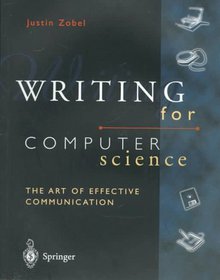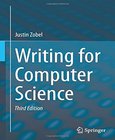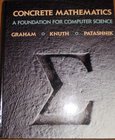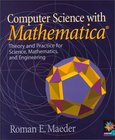Writing for Computer Science

Book Details:
| Publisher: | Springer |
| Series: | Springer |
| Author: | Justin Zobel |
| Edition: | 1 |
| ISBN-10: | 9813083220 |
| ISBN-13: | 9789813083226 |
| Pages: | 190 |
| Published: | Dec 01 1997 |
| Posted: | Nov 19 2014 |
| Language: | English |
| Book format: | |
| Book size: | 11.84 MB |
Book Description:
Scientific papers are an important tool for communicating ideas, of copying thoughts between minds. Public mistakes not only make a scientist look foolish, but they can hurt a career as well. As such, publications should be as free as possible from distortion; this generally means writing with clarity and simplicity, and constructing the thoughts into a clear presentation to omit ambiguity and frustration of reading. Writing for Computer Science is an introduction to the style and presentation of scientific reports with computing or mathematical content. Aimed at students and researchers, this book deals in a concise way with topics such as article design, writing style, illustrations, algorithms, as well as the scientific process itself. With a focus on writing for the mathematical sciences, it: . shows how to design an article; gives practical guidelines for writing style; explains punctuation in a no nonsense way; gives tips for the presentation of mathematics; presents best practice for graphs, figures, and tables; guides on the presentation of algorithms, hypotheses, and experiments; explains about editing and refereeing. Seminar presentation, a section on spelling conventions, and a detailed bibliography complete this handy guide to style and presentation.
Download Link:
Related Books:
Writing for Computer Science
3rd Edition
All researchers need to write or speak about their work, and to have research that is worth presenting. Based on the author's decades of experience as a researcher and advisor, this third edition provides detailed guidance on writing and presentations and a comprehensive introduction to research methods, the how-to of being a successful scientist.Topics include: Development of ideas into research questions; How to find, read, evaluate and referee other research; Design and evaluation of experiments and appropriate use of statistics; Ethics, the principles of science and examples of science gone wrong.Much of the book is a step-by-step guide to effectiv...
Concrete Mathematics
A Foundation for Computer Science
This book contains more than 500 exercise, divided into six categories: (1) Warmups are execises that every reader shoulr try to do when first reading the material. (2) Basics are exercises to develop facts that are best learned by trying one's own derivation rather that by reading somebody else's. (3) Homework exercises are problems intended to deepen an understanding of material in the current chapter. (4) Exam problems typically involve ideas from two or more chapters simultaneously; they are generally intended for use in take-home exams (not for in-class exams under time pressure). (5) Bonus problems go beyond what an average student of concrete mathematics is expected to handle while taking a course based on this book; they extend the text in in...
Computer Science with MATHEMATICA
Theory and Practice for Science, Mathematics, and Engineering
Computer algebra systems have revolutionized the use of computers within mathematics research, and are currently extending that revolution to the undergraduate mathematics curriculum. But the power of such systems goes beyond simple algebraic or numerical manipulation. In this practical resource Roman Maeder shows how computer-aided mathematics has reached a level where it can support effectively many of the computations in science and engineering. Besides treating traditional computer science topics, he demonstrates how scientists and engineers can use these computer-based tools to do scientific computations. A valuable text for computer science courses for scientists and engineers, this book will also prove useful to Mathematica users at all levels...
2007 - 2021 © eBooks-IT.org



